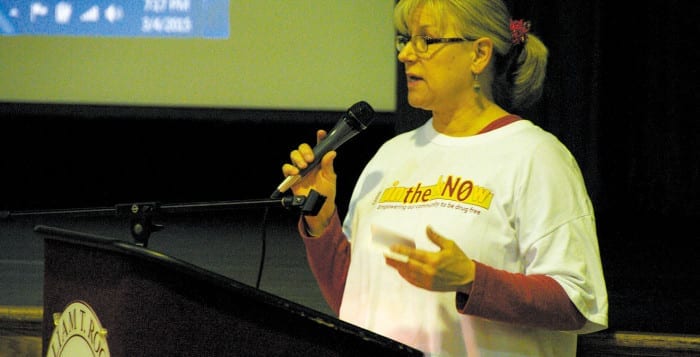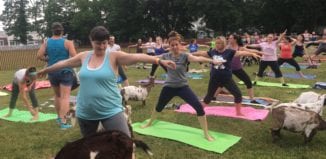Kings Park advocates converge for anti-drug forum
By Chris Mellides
A grassroots advocacy group from Kings Park continued its quest to keep kids away from drugs last week with an informative forum flanked by a star-studded list of guest speakers.
Students attending William T. Rogers Middle School in Kings Park joined their parents at the school gym Wednesday night, March 4, in welcoming the speakers who assembled for the annual preventing destructive decisions forum.
Hosted by Kings Park In the kNOw (KPITK), a grassroots drug outreach and prevention organization, the forum served as an opportunity for parents and their children to become better educated on the perils of alcohol and drug addiction.
Opening the event, a member of the school faculty addressed parents and students who sat opposite a large stage and offered words of encouragement for the young members of the audience.
“Hopefully we can impress upon you tonight how much we love you and how much your families love you and the importance of the actions that you take at this level while you’re here with us at the middle school,” said the one faculty member, before introducing the night’s speakers.
The first speaker at the podium was Kim Revere, a volunteer for KPITK since 2007 and a mother of four. She described getting involved with the organization because of the growing drug problem gripping our communities and the difficulties she faced at home with her 27-year-old son, who at the time was struggling with heroin addiction.
“What Kings Park In the kNOw does is we try to bring educational programs into the schools and into the community to keep parents educated and educate kids as to what the trends are and try to have kids make positive decisions in their lives,” Revere said. “This town is growing and kids are dying. My son has been to rehab nine times; he is finally on the right track. He’s 27 years old and I will not trust him until the day I die. No matter how good he does. I don’t want another parent to live with that pain,” she added.
Suffolk County Legislator Robert Trotta (R-Fort Salonga) was also in attendance and drew from his 25-year background in law enforcement to discuss the lasting impact that narcotics have on local communities.
“I used to say you put the police radio on the counter and when it went off 90 percent of those calls coming out of there are drug or alcohol related,” Trotta said. “Whether it be domestic abuse, a car accident, a robbery or a theft, people break into houses to get stuff to sell to get drugs. They’re not going to be paying their mortgage with it.”
Trotta also delivered an overview of Suffolk County’s Social Host Law and New York State’s 911 Good Samaritan Law passed in 2011, which according to the legislator is a “great law” that states that if you are in a situation involving illicit substances and someone with you is in immediate danger that you should “call 911, and you will not be arrested” through implication.
Rounding out the forum were presentations from Thomas’ Hope founder and drug prevention advocate Linda Ventura, and Kym Laube, executive director of Human Understanding and Growth Services.
Ventura lost her son Thomas to drug addiction in March 2012, when he died from a heroin overdose. Since then she’s been making routine trips to Albany to push for change in the area of addiction treatment services and to better define how we should combat drug use in New York State. On the one-year anniversary of her son’s death, she launched Thomas’ Hope, a nonprofit foundation that promotes drug awareness, prevention and advocacy.
As executive director of HUGS, Laube recognizes the risks that are present for young people and that the unfortunate circumstances that shook Ventura’s household with the loss of her son are becoming increasingly common as drug use grows in popularity throughout Long Island and across the country.
Through the HUGS program she actively seeks to promote social growth among children and adolescents through leadership programs and retreats and allow them to bond and have fun in the absence of drugs and alcohol.
“All of our activities are meant to have kids feel like they are a part of something and a part of something bigger,” Laube said. “So, that we become just as fun of an activity as maybe some of the other high risk choices that are out there.”
Taking time to address the night’s event, Laube reminded parents and students that while beneficial, the real challenge presented to prevention experts and lecturers who engage with an audience is the impact of their messaging over the long term. In order for lasting change to occur, a large community effort is important and necessary, according to Laube.
“We know that unless we begin to have consistent messaging all throughout, that it’s just one night of information,” said Laube. “So what we encourage communities to do is to really begin to bring about that community-level change and to have events regularly and often, and have parenting sessions and get better programs in schools for kids so it moves beyond just this one-shot event.”







